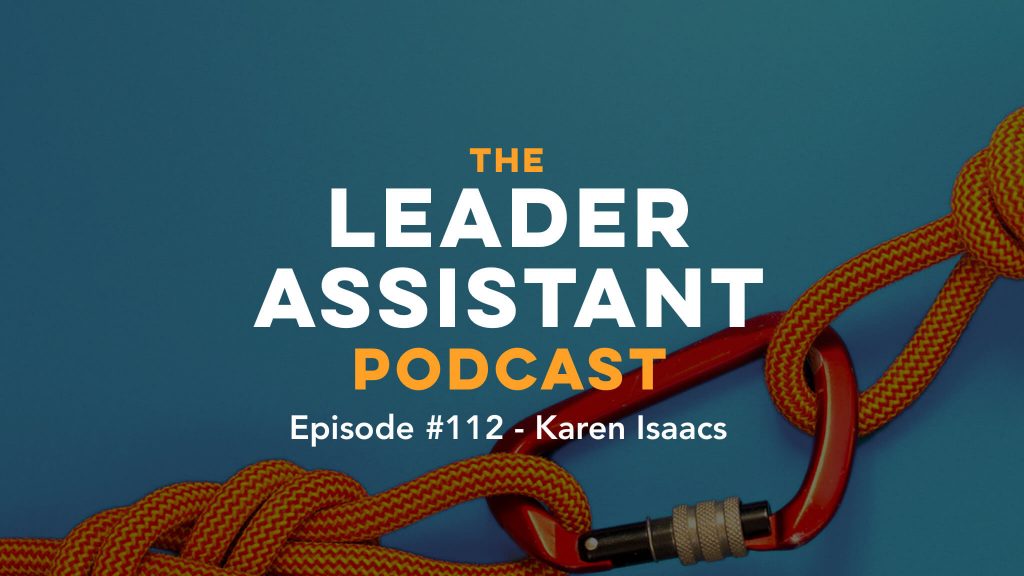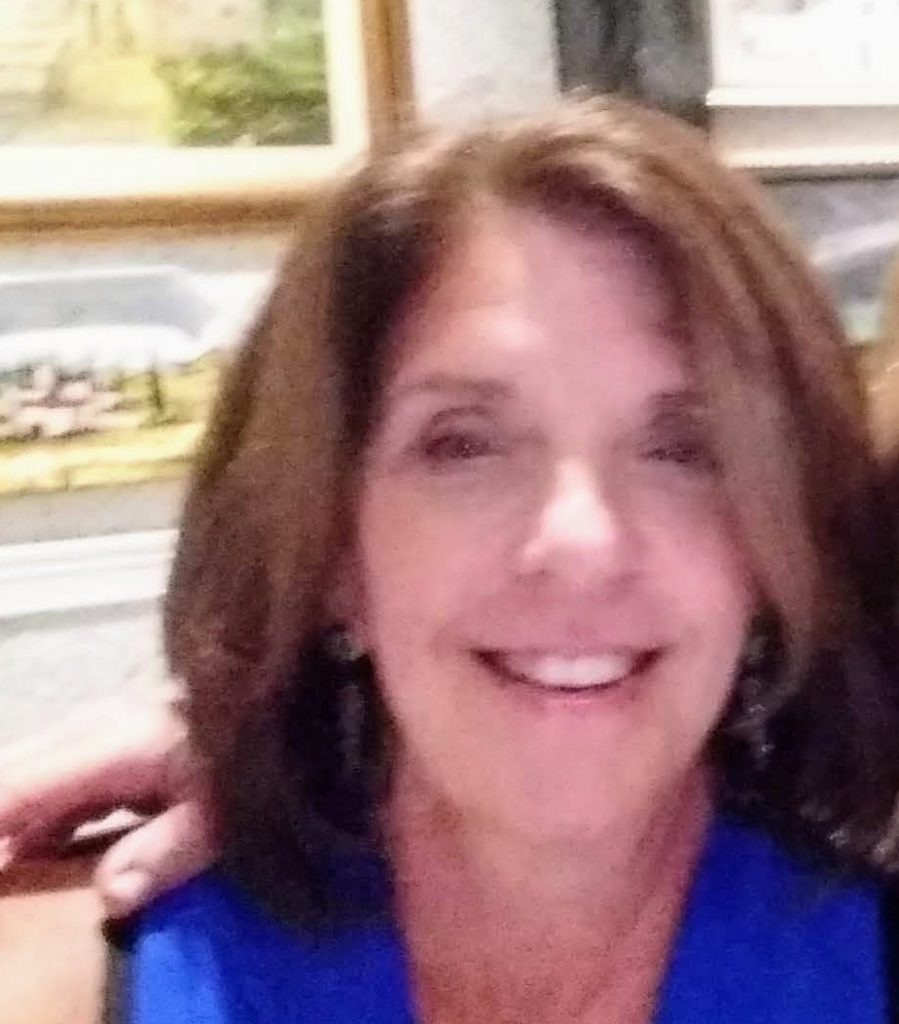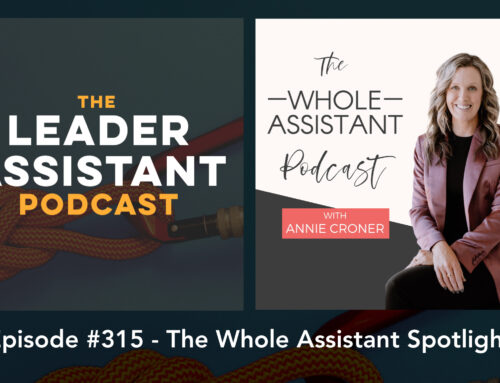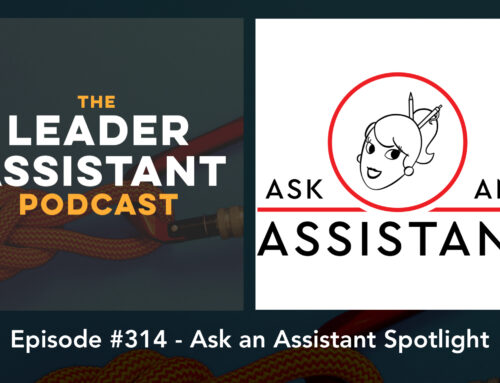Karen Isaacs has been the Director of Administrative Staffing with The Goodkind Group since its inception in 1991. She’s been placing Executive Assistants all the while. She sets herself apart from competition by cultivating relationships to ensure the right fit.
In this episode, Karen shares what she’s learned after placing thousands of EAs throughout her career. Some of the topics we chat about are interviewing, salary negotiation, and working with recruiters.
CONNECT WITH KAREN
THE LEADER ASSISTANT PREMIUM MEMBERSHIP
Check out the Leader Assistant Premium Membership for ongoing training, coaching, and community.
LEADER ASSISTANT LIVE EVENTS
Check out our constantly updated schedule of events for admins and assistants at LeaderAssistantLive.com.
THE LEADER ASSISTANT BOOK
Download the first 3 chapters of The Leader Assistant: Four Pillars of Game-Changing Assistant for FREE here or buy it on Amazon or Audible.
JOIN THE FREE COMMUNITY
Join the Leader Assistant Global Community here, or the Facebook Group here for bonus content and to network with other assistants who are committed to becoming leaders!
SUBSCRIBE
Subscribe to The Leader Assistant Podcast so you don’t miss new episodes!
You can find the show on Apple Podcasts, Spotify, Google Podcasts, Pandora, and Stitcher.
Join my email list here if you want to get an email when a new episode goes live.
LEAVE A REVIEW
If you’re enjoying the podcast, please take 2 minutes to rate and review the show on Apple Podcasts here. Each review helps me stay motivated to keep the show going!
—
EPISODE TRANSCRIPT
Jeremy Burrows 0:00
Hey friends welcome to episode 112 You can check out the show notes at leaderassistant.com/112. Before we jump in, I just wanted to let you know that my Kindle ebook my Amazon Kindle ebook, the leader, Assistant four pillars of a competent game changing assistant is only 99 cents. That’s 99 cents USD this week only, which is Administrative Professionals week. Administrative Professionals day in the US is Wednesday, April 21. So, in honor of you all the leader assistants in the world, I wanted to offer my book for just 99 cents so Amazon.leaderassistant.com And you can grab the Kindle ebook, you don’t need a Kindle device you can read the book on your phone, you can read the book on the Kindle app. You can read it even logged into your Amazon Kindle account in your browser. So Amazon.leaderassistant.com that ebook is only 99 cents for this week only hope you can check it out. Thanks for reading and I hope you enjoy this episode.
Podcast Intro 1:21
The Leader Assistant Podcast exists to encourage and challenge assistants to become confident game changing leader assistants.
Jeremy Burrows 1:31
Thank you for listening to The Leader Assistant Podcast. Hey friends, thanks for tuning in to The Leader Assistant Podcast. It’s your host Jeremy Burrows and today I’m speaking with Karen Isaacs. Karen is director of administrative staffing with the good kind group. Karen, how’s it going?
Karen Isaacs 1:50
Very well.
Jeremy Burrows 1:52
Where are you in the world?
Karen Isaacs 1:54
I am New York. Specifically Long Island.
Jeremy Burrows 1:57
Nice. Have you been there a while?
Karen Isaacs 2:00
Ah, yes, I’ve been my whole life except for College in Boston.
Jeremy Burrows 2:05
Cool. And you work for the good kind group. Give us a quick 62nd pitch on what do you guys do?
Karen Isaacs 2:14
So I’ve been with Peter good kind since the beginning of our career, and went through a couple of iterations. And we I do the administrative executive assistants been doing this since 1987 dating myself here. And the firm has various areas of practice accounting, finance at health care, digital marketing. And I do both mostly permanent EA hires. But definitely a nice amount of temp and temp to perm.
Jeremy Burrows 2:49
Okay, so were you an assistant in your prior life? Or why did you get into the administrative staffing?
Karen Isaacs 2:57
So I wanted to sell ad space out of college and you know, you’re not getting those jobs for Vogue or Time Magazine. And a friend of mine says he was in what they called back then the agency it was really you know, in a whole different world. And he thought my personality would be perfect. And I then interviewed several firms. And the first firm was where I met Peter good kind ma management, I just knew that this was the right business for me. And then when Peter started his own firm, I was his first employee, and no looking back 35 years later,
Jeremy Burrows 3:36
but their focus, is it strictly on administrative staff, right? Like, don’t they have they hire different roles?
Karen Isaacs 3:45
Right. So the firm is split up where everyone is a different area of practice. So I’ve always stayed with placing executive assistants. It’s just what I started with, and just stuck with for various reasons, which I’m sure we’ll talk about and just really cultivated a niche. And here we are.
Jeremy Burrows 4:07
Awesome. So how many assistants have you placed in your estimation?
Karen Isaacs 4:12
You know, it’s funny you say that before quarantine I started to count. It was well over 2000
Jeremy Burrows 4:20
Wow. Yeah. And I’m assuming all various titles right, Administrative Assistant. Assistant, what are some of the more interesting titles?
Karen Isaacs 4:31
I really you know, executive assistant chief of staff sometimes you know, now the new word is Chief People Officer, but it’s really within the administrative support category, hence why I was drawn to you and your podcast and you know, sir, I’ve listened to several obviously. So really within the Administrative Office Manager, no fancy
Jeremy Burrows 4:56
Yeah. What do you look for when you’re trying to find an assistant to place?
Karen Isaacs 5:07
Okay? So that’s easy. I’m very instinctual and guttural. And I’m usually right. And to me, it’s a connectability. So when a candidate is just, you know, I shared in my notes with you just be who you are. And they’re not struggling, and there’s not canned answers, and there’s just a natural flow. Then obviously, after that, I dig down for the specifics, depending on the role, or if it’s in real estate, or a hedge fund, or media. And I really caught with my instincts, they’re rare, rarely off.
Jeremy Burrows 5:47
So if you were to train someone to do your job, how would you help them? Learn those instincts?
Karen Isaacs 5:53
Yeah, so funny enough that my boss used to call it the Isaac’s boot camp. And, you know, I’ve trained people, because I think everyone can learn from different people and different strengths. And there was a time when I was managing and training people. And there were at least 1015 people in my group all really talented for different reasons. So I would tell, you know, take a little of me a little love him a little of her. And then you have to when it goes to the EAS, you have to be who you are. I mean, you know, I hope this doesn’t come across disrespectful to people on my side. But it’s not rocket science, just in terms of use your common sense. You ask the obvious questions, to see if they fit the role, you have to dig deep, you have to be thorough, clearly. But when you really cultivate a natural relationship with the candidate, it’s then the rest just flows, I think, sense of urgency of someone in my business. You either have that or not, I don’t know that you can learn that.
Jeremy Burrows 7:06
Yeah. So when you’re, when you finally when you when you meet someone that you’re like, This is a good connection, this is a good fit for this role we’re trying to fill what’s kind of the process from there to, you know, when did when do you talk about salary needs? And what are what are the best practices in your mind as far as talking about numbers?
Karen Isaacs 7:39
So you know, the rules, the laws have changed, used to be where clients were asking for pay stubs, you know, and now in the last year or so, the rule of thumb is ask the candidate, what are your salary requirements. And because I’ve already developed a good relationship with the candidates, not the first thing I asked, I just naturally connect with them. And then that just unfolds and there’s usually obviously a range. And then if the candidate fits a particular role, clearly, I go over point by point what the candidate has or doesn’t have. One of my strengths and, you know, I’m sure most I’ve listened to some of your other podcasts with other people in my industry, never force an issue. Don’t you know, take a square and shove it in a circle. And this way, the right fit is made, I really care so deeply about the candidate and the fit for them and the client. So then it’s just asking, you know, going through their background, 99% of the time the clients do a background check. So we want to make sure we don’t come up, you know, at the end of the in the end power, and snack foods, so we cover that. And then a lot of it is chemistry. So an EA to a CEO of a hedge fund versus pharma company, sometimes it’s a lot of the time culture fit.
Jeremy Burrows 9:11
Yeah, so what happens if you find a really good fit? And, you know, you guys kind of get into the process, but that executive or that principal, doesn’t want to pay what that EA needs to make.
Karen Isaacs 9:29
You know, thankfully, we rarely come across that because both my clients and my candidates, again, the relationship is so strong prior. You try to negotiate, you know, again, you don’t want to force anything. The clients want to I work with phenomenal firms, there’s, you know, top firms, the integrity, so they are therefore able to attract the candidate. They’re not going to nickel Lend diamond, you know, both client and candidate, you know, are reasonable. One of the best answers I ever heard was a candidate that I was representing. And at the when we were getting close to offer, they asked her what she was looking for. And she said, Well, I know that XYZ firm will make me a fair offer for you and for me, and I just thought that was classy. And this way, we were able to keep it open without locking down a number.
Jeremy Burrows 10:31
Yeah, that’s great. We actually had a conversation a webinar the other day about negotiation. And that was one of the points is, you know, coming back and saying, I know, you’ll be fair, in your offer.
Karen Isaacs 10:44
Right. And they really are. I mean, again, I work with top firms, so they, you know, reputation is stellar. Yeah.
Jeremy Burrows 10:53
So okay, let’s, let’s hear some, let’s hear some mistakes or some failure stories over your years, what, where, what’s the story, maybe a candidate you place and it just went really, really, really poorly?
Karen Isaacs 11:08
Um, so good question. A couple of years ago, I met with a candidate and my instincts, you didn’t love her, she was very reserved, I really feel one of my strengths is I usually can connect to most people, I if someone’s more reserved, you know, clearly, I’m not just going to bombard them with my energy. And the process while she was reserved, you know, it was okay, we cultivated a relationship. And I was able, I’m very honest. And if I can’t give them constructive criticism, and if they can’t take it, then we’re not going to be able to have a productive relationship. So, you know, during the process, I would tell her listen, you come across a little reserved, and I want you to show a little more personality. And she would show it and warm up, but then retreat. And sure enough, before the guarantee period, she was in fact, let go, because she was so reserved, that she couldn’t even cultivate relationships inside or on behalf of our client. So I don’t know if that’s a huge snafu. But my instincts were right, you know, and also, I have a great relationship with this particular client, she was actually on my side of the business, which makes for the best clients, because they understand the frustrations and the ups and downs. And then another quick one was a candidate who is interviewing for a huge EA to a CEO of a global insurance firm. And she had worked for a financial firm, and we went over the background. And when and if there’s an offer made, they check dates of employment and education, and you know, all the obvious. We went over it for the several three months that she was in the pipeline. And she didn’t even need a college degree for this job. And in the end, when she said, she said she fabricated her document from this particular school. And it just kicks you in the hiney in the end, and it was unnecessary, especially because they didn’t even need the degree for this position.
Jeremy Burrows 13:20
Yeah. Yeah. So if I’m an executive assistant in New York City, and I’ve, I have six years of C suite experience, what is a salary range that I could expect?
Karen Isaacs 13:41
Six years, so that’s changed, you know, it? It’s when it’s a candidate market, you know, clearly before all of this prior to March 2020, it was a candidates market now, it’s not so the answer changes. So right now, six years at base, okay. Plus, bonus. And if it’s a financial firm, there’s bonus eligible and paid OT and if it’s not a financial firm or not a hedge fund, maybe 70.
Jeremy Burrows 14:17
And then what do you do to kind of try to think of the word basically, if I’m, if I’m a candidate, and I’m looking for a role, you know, how do I know that? You know, whether it’s you or another placement firm? How do they how do I know that they have and you have my best interest at heart when really you could look at it as well you work for the client and you’re trying to get them you know, the best assistant and you know, you could argue that the cheapest and the best assistant. So how do I know that? It And how can I trust that you or other placement? Firms will take care of me and really fight for me?
Karen Isaacs 15:08
Okay, so I love this question. And it’s my heart. I’m very, very open, very real. I’m very genuine. I’m very direct 99.9% of the candidates that I represent, even if they’re my colleagues candidate, and we work together as a team, they just know like, they know that I have their back. So today, for instance, one of my candidates told me why she didn’t want to pursue a particular role. And right away, I understood where she was coming from. And she, I mean, she also knows me a long time. But I’m never one to force something, it always backfires. So, and I never give up on them. I mean, it could be you know, 13 years later, truly, I play someone last year, who I’ve known for 13 years, we’ve been in touch off and on. I’m a huge, you know, I keep in touch with people really 35 years later. So we really cultivate a relationship, and it could be in three days, or months or years. So with that comes so many examples that they know I have their back. Yeah.
Jeremy Burrows 16:20
Yeah, so it’s a long term relationship, not a, Hey, I’m gonna place you here, and then peace out.
Karen Isaacs 16:26
Never. And in fact, many candidates and this is how I get most of my clients. If I represent a candidate, and I can’t place them because they get another role for their friend or another agency they share with me, I’m not one. I don’t call the other firms, I work all referrals, I don’t cold call. So they know that I care. And therefore they share. And if they do get a role through another firm, sometimes they share some horror stories. And they know that I care so much. So maybe a month or five years later, they then introduce me to that firm. Yeah. So I wish them good luck. It was actually you know, back in the early 90s, at Taiwan, I got one of my candidates gotten an offer through me, and an offer through another agency. And when she turned ours down, my first gut was Oh, darn, but I truly I was like, congratulations. When you get yourself settled, maybe you can introduce me. And sure enough, she did. And it turned out to be a great client, and she stayed there for her whole career. Yeah.
Jeremy Burrows 17:38
So if I’m looking for work, whether I’m tired of my current role, or just, you know, unemployed, and just trying to find a role, what are two things that I should be prioritizing and should be on the top of my list, as far as finding that finding that role?
Karen Isaacs 18:06
Really, the it’s the soft skills, the intangibles, the culture fit, because an EA to five portfolio managers or a CEO or CTO, they can 99% of the time they can do most of these jobs. You know, it’s scheduling these executives all over the world and back and, you know, their calendar management and dealing with their clients. So after that, it’s just a chemistry with the executives. I think so that’s what they you know, I encourage people just like, I’m big on gut instincts, I encourage my candidates to plug into that as well.
Jeremy Burrows 18:48
So what though, can we do if I’m unemployed? And, you know, to get me to these conversations, and, you know, give me the phone call, give me the screen.
Karen Isaacs 19:00
So my cat, you well, if they’re working with a staffing agency, or someone like me, it’s then you know, when I get a position, then I speak to the client, explain why the candidate fits 99% of the time, my clients trust me. So if I tell them, you know, Jane Doe fits this role of John Doe fit to this role. You know, the client goes into it with a trust. So I don’t know if that answered your question.
Jeremy Burrows 19:30
Yeah, I mean, I’m just trying to think like, if somebody’s listening to this podcast right now, and they’re in they’re out of work, which I know there are some assistants that email me every week, every other day sometimes saying they’re out of work or they’re looking for a new you know, work. What’s something they can do just personally to like you’d mentioned soft skills. Is it should they focus on their resume? Should they focus on doing LinkedIn research and networking? What’s something that they can do on their own?
Karen Isaacs 20:02
I think it’s a combination of everything. I do think that candidates who overthink their resume to me the resume should just read clearly no typos, nothing fancy, formatted properly. But sometimes candidates get in bedded in the weeds in the resume. So get the resume, develop relationships don’t sit behind a screen. Clearly candidates, people can’t be out in the world now. So it’s a whole different ballgame. But, you know, prior and soon, hopefully, they you know, volunteer network be out there. I mean, I’ve recently last year, I’ve been posting a lot on LinkedIn. So I’ve been attracting great talent. And, you know, so I now have, you know, a whole new group of great candidates. So they should be on LinkedIn, developing these relationships with other staffing firms. And there’s so many, and sometimes you hear some horror stories. So again, I go back to use your gut instincts, if you’re working with an agency or a person at an agency, and they’re treating you right, you know, they just to cultivate that relationship.
Jeremy Burrows 21:16
Yeah. Awesome. Karen. Well, thank you so much for sharing. How can people reach out to get connected with you and learn more about what you’re up to? And maybe if they’re looking for a role and want to, you know, consider you and your firm? Where should they go?
Karen Isaacs 21:37
Karen@thegoodkindgroup.com. And I’m on LinkedIn sharing a lot of stories of the what I call Jane and John Doe journeys, of candidates and clients and hopefully sharing a little inspiration that way, we all need a little bit. I think it helps motivate people, they feel a little safer than they’ll interview they’ll present better. So I’m on LinkedIn, as well.
Jeremy Burrows 22:00
Great. Well, I’ll put those links in the show notes. Is there anything you want to say just as a send off, to encourage those listening who, you know, you mentioned, it’s not really a candidate market right now, with the pandemic and it can be very discouraging. I know, some assistants have been applying for, you know, dozens and dozens of roles over the last several months. What’s what’s a word of encouragement for those listening that are discouraged on their jobs? Job?
Karen Isaacs 22:28
Yeah, I mean, I’ve been saying this from day one. It’s true all the time, good people and stay the course Don’t stop, keep making relationships. Be very open to constructive criticism. And just, you know, do what you have to do to kind of change your mindset. So if you’re having a down day, step away, take a walk, go for a swim, walk in the woods, it changes your whole mentality, and then you come back. more energized. I
Jeremy Burrows 23:01
love it. That’s great. Karen, thank you so much again, and appreciated chatting with you and we’ll talk soon.
Karen Isaacs 23:07
Thank you Jeremy.
Unknown Speaker 23:17
Please love you on Apple podcast. Goburrows.com







